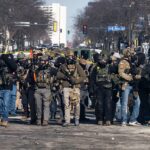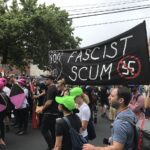Dated Feb. 27, 1951, the United States Department of State’s policy statement declared that the government’s official policy was “to strengthen the idea both in the Chilean Government and among the Chilean people that the interests of the United States and Chile are fundamentally the same.” The document continues with approval for then President Gabriel Gonzalez Videla’s move to outlaw the Chilean Communist Party in 1948 under the Defense of Democracy law. “While we do not necessarily advocate the outlawing of the Communist Party as the most effective way of combating communism, we have expressed a view to the Chileans that every government should meet this threat in the manner it deems most appropriate.”
By 1952, Carlos Ibanez del Campo, who had ruled Chile between 1927 and 1931 after seizing power in a military coup, had returned to the presidency. In 1927, Ibanez made his ideological intentions clear: “One of the greatest factors of unrest in the country in recent times has been communism and anarchism as a work of foresight and social healing, I have the firm intention of repressing them.”
As a candidate for the Agrarian Labor Party under which Ibanez won the 1952 presidential elections, Ibanez’s support came from across a spectrum of leftist and right-wing political ideologies in Chile. In 1953, the US had assessed that Ibanez would “avoid antagonizing” Washington in return for financial aid.
“Root Communism Out”
However, the US also acknowledged that Ibanez faced several opposing political demands, which meant that communist influence in Chile was still a concern. By June 1953, the Popular Socialists were lobbying for repealing the Law of Permanent Defense of Democracy — a demand that Ibanez acceded to in 1958 and replaced with the State Security Law.
Detailing a diplomatic meeting between US and Chilean officials in January 1954, Milton Barall from the Office of South American Affairs noted that “Chile was firmly and decisively on the side of the United States in its desire to root Communism out of the Western Hemisphere and preserve democracy.”
The US wasn’t merely monitoring Chile. Three years into Ibanez’s presidency, the US had concocted a plan to shift Chile’s politics towards neoliberalism by targeting economic education in universities.
The Origins of the Chile Project
The education agreement known as the Chile Project was linked to the 1947 Truman Doctrine which, under the auspices of aiding poorer nations, sought means to curb communism around the world.
In 1949, US President Harry Truman outlined the Point Four Program in his inaugural presidential speech. The plan was discarded by President Dwight Eisenhower in 1955, who founded the International Cooperation Administration (ICA) — a precursor to USAID — tasked with funding nonmilitary assistance in developing countries and with the same pretext of eliminating Communist influence.
In 1955, Ibanez had sought US advice to curb inflation in the country through the private consulting firm Klein-Saks. The move was opposed by the Chilean public but heavily promoted by Augustin Edwards, business mogul and owner of the right-wing Chilean newspaper El Mercurio. The paper declared the assessment came “without prejudices of any kind, to examine objectively the situation and to objectively recommend what is necessary to do to re-organize the country economically, financially, and administratively.”
That same year, the Chicago project was officially formalized. Its origins dated back to 1953, when ICA representative Albion Patterson held discussions with University of Chicago Dean of Economics Theodore Schultz. The latter had received $875,000 in grants from the US government and sought to test his economic theories in Chile.
“Academic Hegemony”
Represented by Patterson, the University of Chicago’s Faculty of Economics and the Catholic University of Chile established an educational agreement in 1955. In March 1956, the Catholic University of Chile welcomed a group of US economics professors. That September the first group of Chilean economics students departed for Chicago, studying under the tutelage of Arnold Harberger and Milton Friedman, among others. The Chicago Project would repeal Marxist-orientated economics teaching in Chile that emphasized the state’s role in the national economy.
In the words of Chilean historian and political scientist Manuel Garate, the Chicago Boys, as the students later became known, “wielded cultural influence … and established academic hegemony at the Catholic University of Chile.” Between the endeavors of both the government and the private sector, the foundations of neoliberalism took root in Chile, and its application would come to fruition during Augusto Pinochet’s dictatorship.
From 1956 until 1964, dozens of economics students studied at the University of Chicago, among them Sergio de Castro, Pablo Baraona, Álvaro Bardón, Emilio Sanfuentes, Rolf Luders, Sergio de la Cuadra, Ernesto Silva, Cristián Larroulet, Ernesto Fontaine, Miguel Kast, and Joaquín Lavín. Many later held influential positions in government, education, and finance during the dictatorship era and well into the recent democratic years.
“The Brick”
By 1959, the first Chicago students had returned to Chile and started affecting changes in the Economics Department of the Catholic University, creating rifts that eventually led to the resignation of the faculty dean in 1964. Outside of university, the Chicago graduates used the media to pen their opinions, striking a conservative tone and putting themselves in direct opposition to the Chilean left.
In 1967, Edwards allocated a page in El Mercurio for the Chicago Boys to promote neoliberal economics. Adelio Pipino and Emilio Sanfuentes were the first contributors who later brought other Chicago graduates to contribute to the page. By this time, Chile was under the presidency of Eduardo Frei Montalva, whose electoral triumph in 1964 received the backing of the CIA, which spent $2.6 million directly underwriting the campaign to prevent socialist candidate Salvador Allende from becoming president.
Since the Klein-Saks consultancy, Edwards remained a central figure in Chile’s rightward shift. In 1968, Edwards financed a think tank — the Center for Socioeconomic Studies — which had been planned since 1964 and provided a space for the Chicago Boys to take an active stance in politics.
Since the Klein-Saks consultancy, Edwards remained a central figure in Chile’s rightward shift.
Chicago graduate Emilio Sanfuentes Vergara, a leader of the project, took over El Mercurio’s economics page and played an instrumental role in writing El Ladrillo, or “The Brick.” El Ladrillo was a study that later became the dictatorship’s economic policy, and it outlined a neoliberal economic outlook for Chile. It was completed just weeks before the US-backed coup took place on Sept. 11, 1973.
CIA Funds
Edwards, meanwhile, was forging other connections that would aid Chile’s military coup. In 1967, Edwards cofounded the Cofradía Náutica del Pacífico Austral (Nautical Brotherhood of the Southern Pacific). The Nautical Brotherhood included naval officers and business administrators whom Edwards employed and who were involved in planning the military coup. They also had knowledge of the Chicago Boys’ neoliberal economic plan for Chile. According to historian Jorge Magasich, naval officers veered towards the political right. Among the lower ranks, on the other hand, many endured imprisonment and torture at the hands of naval officers in Valparaiso when the coup happened.
Having set the foundations in Chile, Edwards turned to the CIA in 1970. Allende triumphed at the presidential election of Sept. 4, 1970, but 10 days later, according to declassified documents, Edwards appeared in Washington for talks with the CIA about toppling the socialist government. In 1971 and 1972, acting upon the CIA’s instructions, the 40 Committee made payments to El Mercurio to aid the destabilization of Allende’s government.
This was in addition to a payment President Richard Nixon himself made to Edwards in 1971. In less than a year, El Mercurio received $1.95 million in funds to cover covert action geared towards the military coup against Allende. Owing to El Mercurio’s important propaganda role, the CIA continued to fund Edwards until June 1974. Thus, in complicity with Edwards, the Chicago Boys’ role in destabilizing Chile through economic propaganda also enjoyed CIA funding.
Pinochet and the Chicago Boys
An essay by Orlando Letelier first published in 1976, just a month before DINA assassinated inhim Washington, spells out how the dissociation between Pinochet’s repression and market policies enabled the latter to gain international support.
Detentions, torture, killings, and disappearances characterized the early days of the military coup and continued unabated through Pinochet’s iron-fisted rule. Meanwhile, with the initial oppression and elimination of political opponents laying the groundwork, neoliberalism’s implementation began to take shape.
In 1974, Friedman, who mentored the Chicago Boys, and who had traveled with Harberger to Chile in 1975, declared, “In spite of my profound disagreement with the authoritarian political system of Chile, I do not consider it as evil for an economist to render technical economic advice to the Chilean Government, any more than I would regard it as evil for a physician to give technical medical advice to the Chilean Government to help end a medical plague.”
Detentions, torture, killings, and disappearances characterized the early days of the military coup and continued unabated through Pinochet’s iron-fisted rule.
After its presentation to Navy Admiral Jose Toribio Merino just before the coup, El Ladrillo became the blueprint for the dictatorship’s economic and social change, which Friedman and Hargerber described as inevitable and necessary “shock treatment.”
Allende had nationalized Chile’s industries, but those soon went to the private sector and transnational corporations. Meanwhile, private companies’ monopoly on goods sent prices skyrocketing for consumers. Despite Pinochet enjoying the backing of the World Bank for his neoliberal experiment, IMF statistics recorded higher unemployment rates, declining rates in national income, mining, manufacturing, and construction.
“Neoliberalism is Born and Dies in Chile”
The lack of expertise in economics among members of the military junta provided the Chicago Boys with ample space to maneuver in politics. Tasked by Pinochet to alter Chile’s economy, the Chicago Boys quickly became part of Chile’s elite from the early years of the dictatorship and beyond. De Castro, for example, became Minister of Economy from 1975 until 1976 and Minister of Finance from 1976 until 1982. Baraona held positions as economy minister, mining minister, and president of the country’s Central Bank. Roberto Kelly, a Chicago graduate and naval officer who also worked for Edwards, served as Minister of Economy between 1978 and 1979. In 1982, Miguel Kast became president of Chile’s Central Bank.
During the 2019 protests which erupted across Chile, one slogan directly related to the Chicago Boys’ influence in the country was “neoliberalism is born and dies in Chile.” However, the long road toward drafting a new constitution — two attempts so far have met rejection within a year — Chilean society remains deeply polarized, according to President Gabriel Boric. Still, it is worth turning back to Letelier’s assessment of economics and repression, which also reflects how Chilean presidents have used the dictatorship’s legacy since the transition to democracy.














